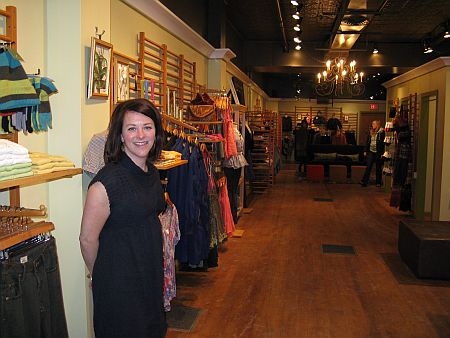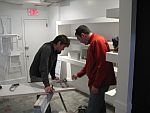Part of the special VPR Series "Hitting Home: The Recession and Vermont"

(Host) The recession has hit home for Vermont families and businesses. It’s been more common lately to hear about layoffs than ribbon-cuttings.
But some businesses are bucking that trend, choosing to expand despite the uncertainties.
VPR’s Ross Sneyd caught up with a couple of business owners that are banking on an economic rebound.
(Sneyd) More than a handful of storefronts have gone vacant in downtown Burlington.
(Sounds of sanding)
(Sneyd) But in some of those spaces, construction workers like Ed Lovejoy are getting some much-needed work.
 (Lovejoy) "We’re hoping for a pickup in the spring. We anticipate a slowdown and are working with it. But outside of that, the phone rings a lot less.”
(Lovejoy) "We’re hoping for a pickup in the spring. We anticipate a slowdown and are working with it. But outside of that, the phone rings a lot less.”
(Sneyd) Lovejoy got three weeks of work to renovate this small space.
It’s for business owner Rachel Strules.
She says her store, called Trinkets, will sell scarves, belts, handbags, sunglasses – all kinds of women’s accessories.
(Strules) "The whole reason I decided to do an accessory-only store is it’s a way to stretch your wardrobe. It’s a way to add to your wardrobe without making a huge expense. So you can have an inexpensive piece of jewelry in a gallery-like setting and it makes it really fun. It makes it pop. You’re like, `What’s that? Ooh, that’s fancy.’ But it’s only $10.”
(Sneyd) Strules already owns two women’s clothing stores on Burlington’s Church Street mall.
When this space opened up, she grabbed it. Despite a slowing economy, she saw it as an opportunity to complement her clothing stores.
 (Strules) "I really plan on changing the inventory seasonally to reflect, a) what’s going on in the economy, or b) what’s happening with the weather. C) What are the customers demanding. With such a small space I think I’ll really have the flexibility to change rapidly.”
(Strules) "I really plan on changing the inventory seasonally to reflect, a) what’s going on in the economy, or b) what’s happening with the weather. C) What are the customers demanding. With such a small space I think I’ll really have the flexibility to change rapidly.”
(Sneyd) St. Michael’s College economist Herb Kessel isn’t surprised that some businesses are expanding.
(Kessel) "In all recessions there are companies that do well. … People may simply change their consumption patterns and move to lower value, maybe, less markup, less expensive products.”
(Sneyd) The Burlington area is surviving this recession better than most regions of the state. City economic development officials say retail and commercial vacancy rates are below historic averages. The airport is growing. And improvements to the Church Street shopping district are planned this summer to keep people coming downtown.
Kessel says the Burlington area is helped by employment in education, health care and government. Those industries have held their own up to now while manufacturing and export-dependent businesses have declined.
(Kessel) "Many of the layoffs are coming in the national and international and global national firms. So, perhaps we are a little less dependent on large firms and so we haven’t experience quite the same number of layoffs.”
(Sneyd) Up the road from Burlington in Colchester, just listen to what’s happening.
(Sound of construction)
(Sneyd) Yes. It’s construction again.
This time it’s renovations for the Albany College of Pharmacy and Health Sciences.
(Sounds of footsteps on stairs)
(Bob Hamilton) "We’ll be modifying doorways so you can get in the information commons from that direction and then on this side, the other side … we’ll have our other major lecture facility over here on this side.”
(Sneyd) Bob Hamilton is associate dean of the Albany College. He shows an office building the New York school is retrofitting for the 70 students who will enroll in August.
Hamilton says people still have to fill their prescriptions – in good times or bad.
(Hamilton) "We know the demand for pharmacists is very high right now and even given that there may be all the more reason for students to say, `Hey, what can I do.’ And we have seen some student applicants come from other fields and they’re saying, `Gee, I went into this field and it’s not so hot right now but pharmacy looks like it’s going to be strong.’ And all the predictions are that pharmacy will continue to be strong.”
(Sneyd) Albany College feels confident that, while it’s not immune to recessions, it is in a good position to expand.
(Sneyd) Back in Burlington, Rachel Strules knows it’s riskier for a small retailer.
Sales at her Sweet Lady Jane and Tribeca stores were down about 10 percent over the holidays.
So she’s been careful. She cut her spring orders by about 20 percent. And she’s told her staff to treat customers as royalty.
(Strules) "A good customer comes in and she’s buying a bunch of things, we can say to her, `Oh, we’ll give you that half price if you’d like that and you’ve already bought these other things.’ Or even a regular that comes in that says, `Oh, I need a pair of earrings to go to a special event, but I don’t want to spend that much money.’ And they look and they look. And she’s like, `Oh, I love those.’ I can say, `You love them, I’ll give you 20 percent off.’ So we have the freedom to react quickly.”
(Sneyd) Strules says repeat customers recognize when they get good service.
(Sound of cash register, credit card printer)
(Sneyd) The way she figures it, that usually means they’ll come back, even in a recession, even if it’s just for that “little something special.”
For VPR News, I’m Ross Sneyd.
Note: This is one in an occasional series on how the economy is affecting Vermonters. To listen to other stories in the series, click on the link below.”
Top Photo: Rachel Strules at her shop "Sweet Lady Jane" in Burlington